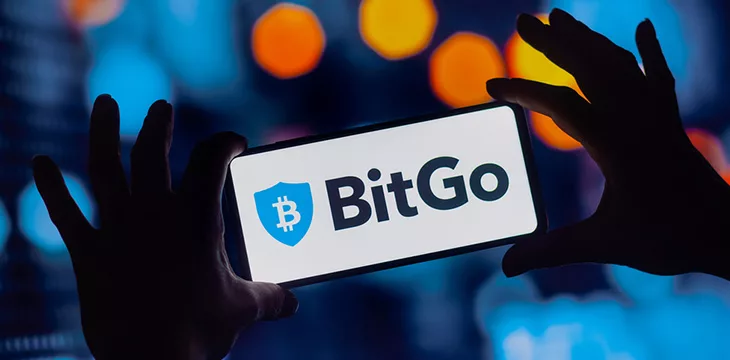|
Getting your Trinity Audio player ready...
|
Digital asset custodian BitGo has somehow raised $100 million at a significantly higher valuation than last year, despite an equally significant reduction in venture capital interest in the blockchain sector.
On Wednesday, BitGo announced that it had raised $100 million in Series C funding at a valuation of $1.75 billion. The company issued a statement saying the interest came from “new, outside strategic investors” in the U.S. and Asia. The funds will be utilized to “make strategic acquisitions and expand its secure and regulated custody, wallet, and infrastructure solutions globally.”
The California-based BitGo trotted out an impressive array of statistics justifying its higher valuation. These include a 60% rise in new clients this year, a 20% rise in assets under custody, and a forty-fold rise in digital assets staked. Founded in 2013, BitGo claims it processes around one-fifth of all global BTC transactions by value.
However, the assets under custody stats were partly juiced by the fact that BitGo was enlisted as the new custodian of assets controlled by FTX Debtors, the court-appointed overseer of what’s left of Sam Bankman-Fried‘s collapsed ‘crypto’ empire. BitGo has said its FTX assets total over $1 billion, the safeguarding of which earns BitGo $100,000 per month on top of a $5 million retainer.
BitGo recently launched its Go Network, a real-time settlement channel for institutional clients transacting in both U.S. dollars and digital assets. BitGo is apparently trying to fill the void left by this spring’s collapses of Silvergate Bank and Signature Bank, both of which offered similar round-the-clock settlements via their respective SEN (Silvergate) and Signet (Signature) networks.
The funding announcement comes nearly a year after Mike Novogratz’s Galaxy Digital (NASDAQ: BRPHF) fintech firm walked away from a proposed $1.2 billion acquisition of BitGo. The deal’s demise resulted in a messy he-said/she-said aftermath, with Galaxy claiming BitGo failed to provide audited financial statements by a stipulated date. BitGo called these claims “absurd,” countering that the deal’s expiration date wasn’t until the end of 2022.
BitGo later sued Galaxy to collect a $100 million ‘breakup’ fee, arguing that the real reason Galaxy got cold feet was the latter firm’s nearly $555 million loss in the second quarter of 2022. That suit was dismissed in June after a federal judge ruled that BitGo had submitted “non-compliant” documents regarding its fiscal situation. BitGo has vowed to appeal the ruling.
Investors souring on blockchain
BitGo CEO Mike Belshe played coy regarding the identities of the funding round’s participants, telling Bloomberg only that they include investors from ‘outside the crypto industry.’
BitGo wasn’t previously so shy about identifying its investors, the ranks of which include Bill Lee’s Craft Ventures, Digital Currency Group (DCG), DRW (parent of market-maker and Tether fan Cumberland Global), Goldman Sachs (NASDAQ: GS), Pantera Capital, and the aforementioned Galaxy Digital.
Wherever the cash came from, BitGo’s $100 million raise is a significant outlier in an investment climate that is seeing far fewer nine-figure deals. PitchBook data showed a total of $2.34 billion in venture capital flowing into blockchain-based projects in the second quarter of 2023, a significant decline from the peak of $12.14 billion raised in Q1 2022.
Venture capital firms made 382 blockchain-focused deals in Q2, including a $120 million Series B round for ‘omnichain interoperability protocol’ LayerZero and the $115 million Series C round for the ‘almost certainly the subject of an upcoming Michael Lewis exposé’ WorldCoin. The fact that the U.S. Securities and Exchange Commission (SEC) is belatedly tightening its oversight of blockchain projects based on tokens of dubious utility has contributed to this icy investor climate.
Crunchbase offered an even less positive outlook of the current VC environment, citing 322 blockchain/Web3 deals worth around $1.8 billion in Q2, roughly flat quarter-on-quarter but down significantly from $7.5 billion in the same period last year.
Prime (re)mover
BitGo has undoubtedly benefited from a thinning of the herd of U.S.-based digital asset custodians, including rival Prime Trust, which filed for bankruptcy protection this week. In a somewhat ironic inversion of the Galaxy Digital debacle, it was only two months ago that BitGo walked away from a deal to buy Prime Trust after getting a closer look at Prime Trust’s financial records.
Shortly after the Prime Trust deal fell through, BitGo’s Belshe revealed that the company had other acquisitions in the works. Belshe predicted “there’s going to be consolidation in the space over the next six months” and vowed that BitGo would be “talking to pretty much every big deal that’s out there.”
That said, whether this lack of competition fully justifies BitGo’s dramatic valuation hike is debatable. There are also questions as to why BitGo didn’t need to raise money before making its deal for Prime Trust but does need cash now—particularly given the Delaware court siding with Galaxy’s version of events regarding BitGo’s apparent reluctance to disclose audited financial statements.
While this week’s $100 million vote of confidence suggests there are no significant issues currently plaguing BitGo, remember that Prime Trust raised $107 million in June 2022. One year later, Prime Trust is bankrupt and customers/investors are waiting to learn how many pennies on the dollar they might recoup.
Also, remember that despite Prime Trust proudly declaring itself to be licensed, regulated, and subject to both state and federal oversight, its execs still ended up ‘borrowing’ customer cash to replace digital assets that were lost forever when the company misplaced the private keys to digital wallets. And all this happened before it raised that $107 million.
Honestly, we’re not trying to raise doubts about BitGo here. It’s just that there’s been no shortage of ‘you had one job’ jokes made about the digital asset custody sector in recent months, even as fewer and fewer people see the humor.
Watch: Venture Investments for the Future of Bitcoin & Blockchain

 07-13-2025
07-13-2025 





